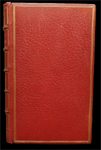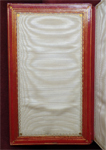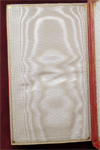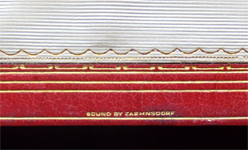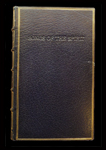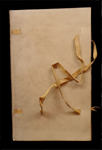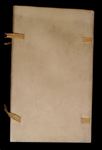100th
MP

|
THE
100th
MONKEY
PRESS |
|
|
|
Limited Editions by Aleister Crowley & Victor B. Neuburg |
|
Bibliographies |
|
Download Texts
»
Aleister
Crowley
WANTED !!NEW!!
|
|
SONGS OF THE SPIRIT |
|
Image Thumbnails |
||||||||||||||||||||||||||||
|
Title: |
Songs of the Spirit. |
|
||||||||||||||||||||||||||
|
Variations: |
|
|||||||||||||||||||||||||||
|
Publisher: |
Kegan Paul, Trench, Trübner & Co.1 |
|||||||||||||||||||||||||||
|
Printer: |
Chiswick Press, Charles Whittingham and Co., Tooks Court, Chancery Lane, London.1 |
|||||||||||||||||||||||||||
|
Published At: |
London.1 |
|||||||||||||||||||||||||||
|
Date: |
1898.1 Dr. Richard Kaczynski places the publication date as December 1898.6, 9 |
|||||||||||||||||||||||||||
|
Edition: |
1st Edition. |
|||||||||||||||||||||||||||
|
Pages: |
x + 110 .5 |
|||||||||||||||||||||||||||
|
Price: |
Copies printed on machine-made paper were priced at three shillings, sixpence.1 Copies were later sold for seven shillings, sixpence.8 Copies printed on hand-made paper sold for seven shillings, sixpence.9 |
|||||||||||||||||||||||||||
|
Remarks: |
Dedicated to Julian L. Baker.1 Title page printed in red and black.1 Crowley was disappointed with Kegan Paul's management of his book sales and closed his account with them in May of 1904. Between 1902 and 1904, Kegan Paul had not managed to sell even one copy of Songs of the Spirit.7 |
|||||||||||||||||||||||||||
|
Pagination: Applies to States (a) and (c)2 |
|
|||||||||||||||||||||||||||
|
Pagination: Applies to State (b)5
|
|
|||||||||||||||||||||||||||
|
Contents: |
- In Memorium A.J.B.; Amsterdam, December 23rd, 1897 - The Quest - The Alchemist - Sonnets to Night - The Philosopher’s Progress - Sonnet - An Ill Dream - The Student - The Priest Speaks - Passover - The Violet’s Love-Story - The Farewell of Paracelcus to Aprile - A Spring Snowstorm in Wastdale - In Neville’s Court, Trinity College, Cambridge - Succubus - A Rondel - Nightfall - The Initiation - Isiah. A Sonnet - The Storm - Wheat and Wine - A Rondel - The Visions of the Ordeal - Power - Vespers - By the Cam - Astrology - Daedulus - Epilogue |
|||||||||||||||||||||||||||
|
Author’s Working Versions: |
|
|||||||||||||||||||||||||||
|
Other Known Editions: |
|
|||||||||||||||||||||||||||
|
Bibliographic Sources: |
|
|||||||||||||||||||||||||||
|
Comments by Aleister Crowley: |
Again, I wrote a poem on the death of my Aunt Ada, which I thought good enough to include in my Songs of the Spirit, and is entirely irreproachable on the score of piety. It seems as if I possessed a theology of my own which was, to all intents and purposes, Christianity. My satanism did not interfere with it at all; I was trying to take the view that the Christianity of hypocrisy and cruelty was not true Christianity. I did not hate God or Christ, but merely the God and Christ of the people whom I hated. It was only when the development of my logical faculties supplied the demonstration that I was compelled to set myself in opposition to the Bible itself. It does not matter that the literature is sometimes magnificent and that in isolated passages the philosophy and ethics are admirable. The sum of the matter is that Judaism is a savage, and Christianity a fiendish, superstition. — The Confessions of Aleister Crowley. New York, NY. Hill and Wang, 1969. Page 73. ______________________________
A certain
amount of conscious aspiration is, however, evident in Songs
of the Spirit. This book is a collection of lyrics which
reveal an ill-defined longing for spiritual attainment. The
background is vividly coloured by observation and experience.
The atmosphere of the old streets of Amsterdam, of the colleges
of Cambridge and of the mountains, lakes, forests and rivers,
among which I wandered solitary, is evident in every stanza. The
influence of my reading is almost negligible. The
“wish-phantasm” of the book is principally that of a wise and
holy man living in a lonely tower, master of the secrets of
nature. I had little conscious aspiration to that ideal. In
practice, I was living for pleasure. ______________________________
My poetry at this time is charged to the highest point with these aspirations. I may mention the dedication to Songs of the Spirit, “The Quest”, “The Alchemist”, “The Philosopher’s Progress”, “A Spring Snowstorm in Wastdale”, “Succubus”, “Nightfall”, “The Storm”, “Wheat and Wine”, “Vespers”, “Astrology” and “Daedalus”. In “the Farewell of Paracelsus to Aprile”, “The Initiation”, “Isaiah” and “Power”, I have expressed my ideas about the ordeals which might be expected on the Path. All these poems were published in 1898. In later volumes, Mysteries Lyrical and Dramatic, The Fatal Force, The Temple of the Holy Ghost and Tannhäuser, these ideas are carried further in the light of my practical experience of the Path. — The Confessions of Aleister Crowley. New York, NY. Hill and Wang, 1969. Page 146-147. |
|||||||||||||||||||||||||||
|
Reviews: |
That three out of eight volumes taken at random from the stack of recent books of minor verse should have the root of the matter in them, and one of the three in high degree of excellence, is a very large proportion indeed. So far as the mere form goes, the ephemeral verse of the day is undoubtedly on a high level. Most of its professors can at least write smoothly, many even musically; and though the volume of poetry was probably never so great as now, the proportion of mere doggerel was probably never so small. It is when we pass from the test of mere form and take the greater test of substance that its insufficiency stands revealed. It is a fairly common thing for educated people to be able to write smooth verse; it is one of the rarest of human attainments to have a direct personal knowledge and experience of life coupled with the imaginative force that can transfigure that knowledge into insight. That is the endowment of the poet as distinguished from the easy practice of the versifier; and to find evidence of it in any degree, however slight, in three volumes out of eight is an unaccustomed proportion of grain to chaff. We must ruthlessly exclude the first three authors on our list from any part or lot in the poet’s endowment. They are hopelessly commonplace; Mt. Hunt Jackson undisguisedly so, and Mr. Crowley under a veil of mysticism that, being lifted, never by any chance reveals a meaning worth the trouble of finding out. For some of his verses we confess that we can find no meaning at all, worthy or otherwise. Such conundrums as:
Apart, immutable, unseen, Being, before itself had been, Became. Like dew a triple queen Shone as the void uncovered.
may have the weight of deep philosophy in them, but to us they are uncommonly like nonsense verse, reminding us more than anything else of Lewis Carroll’s
’Twas brillig, and the slithy tovos Did gyre and gymble in the wabe—
taken seriously. —The Daily News, 21 July 1899. ______________________________
“Songs of the Spirit,” by Aleister Crowley, evidently a poet of fine taste and accomplishment. This booklet contains much that is beautiful. (Kegan Paul, Pp. 109. 3s. 6d.) —The Outlook, 17 December 1898. ______________________________
By a young author, as we guess, musical and mystical, full of too vivid reminiscences of Swinburne, with sweeter inspirations of Hood, the “Songs of the Spirit,” by Aleister Crowley (Kegan Paul, Trench, Trübner and Co.) disclose much grace in thought and in versification. They give hope that whenever he has learnt a message fully worth delivering the author will speak it with beauty and effect. The prettiest and most intelligible of the collection of artistic little poems is, perhaps, “The Violet’s Love-story.” —Jewish Chronicle, 30 December 1898. ______________________________
We imagine Mr. Aleister Crowley, author of Songs of the Spirit (Kegan Paul), to be a young man; evidently he is just passing through the Swinburnian epoch. His verse is full of the influence of “Poems and Ballads”; it contains a riot of words without much thought at the back of them. We seem, for example, to have heard this sort of thing a good many times before:—
The garland I made in my sorrow Was woven of infinite peace; The joy that was white on the morrow Made music of viols at ease. The thoughts of the Highest would borrow The roar of the seas.
And yet, despite a good deal of bombast about “lust being one with love,” and the like, Mr. Crowley has many poetical qualities and a great deal of promise. His muse is windy, and boyish in over-emphasis, but he has a true sense of musical sound, and metrically, he has scarcely a bad line. He should mature and live to write very respectable verse. We doubt if he will ever be original; but in the middle way of discipleship he ought to do well enough. —Literature, 6 May 1899. ______________________________
In the epilogue to his “Songs of the Spirit,” Mr. Crowley tells us that
The garland I made in my sorrow Was woven of infinite peace,
and he prays that “for an hour Let my rhyme be not wholly unsweet.” Nor shall it be, seeing how rich and melodious are many of his poems, besides being full of powerful and original thought. Their tendency is that of the occult philosophy, of a wild and lurid colouring enough it may be, but in no instance devoid of the marks of a true poetic imagination. —The Bookseller, 3 February 1899. ______________________________
This modest little volume contains many beautiful thoughts expressed in delicate phrases: daring verses too, which cannot lightly be overlooked. “The Farewell of Paracelcus to Aprile,” “The Initiation,” “The Philosopher’s Progress,” are finely-wrought images from Mr. Crowley’s vivid mind. Little lyrics of sunshine and wind; “Vespers,” with its chant-like march:
The censer swings to slower time, The darkness falleth deep; My eyes, so solemn and sublime, Relent, and close, and weep: And on the silence, like a chime, I heard the wings of Sleep.
“The Quest” is another poem to ponder over, and to understand with difficulty:
Now backwards, inwards still my mind Must track the intangible and blind, And seeking, shall securely find Hidden in secret places Fresh feasts for every soul that strives, New life for many mystic lives, And strange new forms and faces.
Each page is impressed with the stamp of an individual mind. Facing the title-page is a verse from The Tale of Archais. —The Oxford Magazine, 29 November 1899. ______________________________
We shall be sorry if anyone who cares much for verse in itself, who is curious of new tendencies in contemporary poetry, and values the articulate expression of an individuality, should miss a little book of unusual quality, called “Songs of the Spirit,” by Aleister Crowley (Kegan Paul and Co., 8vo., pp. 109, 3s. 6d.). We have read it with admiration for its intense spirituality, as well as for its technical superiorities, and with sympathy for its spontaneous reflection of certain moods—byways of poetry, no doubt, that Mr. Crowley pursues almost without variation except in the movement of his rhythms, now swift as desire and now slow as remorse, with an utterance at once mysterious and vivid. Visions of temptation and of beatitude, wavering aspirations to serenity and knowledge, hymns and rhapsodies of a devout mysticity, emotional descriptions illustrating that saying of Amiel’s, ‘Les paysages sont des états d’éme’—such are the contents of this volume, in which we are sure of having heard an impressive and an original voice dominating diverse echoes that we hesitate whether to ascribe to literary influences or to coincidence of temperament. For there are things that suggest the names of Goethe and of Baudelaire; others such as “The Quest” and that strange “Philosopher’s Progress” which begins
That which is highest as the deep Is fixed, the depth as that above; Death’s face is as the face of Sleep; And Lust is likest Lust,
share at least Blake’s impenetrable simplicity of form, and their symbolism is, like his, curiously seductive, even where it seems turned to obscurantism; elsewhere Mr. Swinburne is (if only superficially) recalled; and “Vespers” is by no means unworthy of Rosetti. Similar preoccupations, again, direct the muse of Mr. Francis Thompson; but the verse of “Songs of the Spirit”—essentially intimate , introspective if you like—is also free from obvious artifice and eccentricity, it is fiery and clear-measured and easy of phrasing. We venture to quote from a poem dated “Amsterdam” some lines exemplifying Mr. Crowley’s talent:
Let me pass out beyond the city gate, Where I may wander by the water still, And see the faint few stars immaculate Watch their own beauty in its depth, and chill Their own desire within its icy stream. Let me move on with vacant eyes, as one Lost in the labyrinth of some ill dream, Move and move on, and never see the sun Lap all the mist with orange and red gold, Throw some lank windmill into iron shade, And stir the chill canal with manifold Lays of clear morning; never grow afraid When he dips down beyond the far flat land, Know never more the day and night apart, Know not where frost has laid his iron hand, Save only that it fastens on my heart; Save only that it grips with icy fire These veins no fire of hell could satiate; Save only that it quenches this desire. Let me pass out beyond the city gate.
We should like to give other examples, but we can only name some of those pieces that seem to us most remarkable. Such are “An Ill Dream,” of which the glowing imagery seizes and holds fast the vagueness of shifting impressions; a “Farewell of Paracelsus to Aprile,” containing some fine lyric flights; “The Initiation,” and “Succubus,” a record of fearful obsessions in a metre which, in spite of a few unaccountable lapses, we think extremely effective. —The Manchester Guardian, date unknown. ______________________________
“Songs of the Spirit,”
by Aleister Crowley, ascend, as the motto on the
title-page—“Sublimi feriam sidera vertice”—indicates, to higher
regions, which seem peopled with an unusual number of gory
phantoms. They are difficult to read, and where they touch
definite things more sensual than sensuous. A poet’s dreams are
not often so persistently full of “miasmal pestilence-light” as
these. We do not like “dawny” and “frondage,” and cannot say
these verses deserve to be read—sung they could hardly be. ______________________________
Ambitious verse, which, if we are right in supposing it to be
the work of youth, enables us to predict excellent work from Mr.
Crowley when his philosophy of life has been matured. ______________________________
Though we cannot identify ourselves with the sentiments
expressed in its pages, we must acknowledge that the poems show
very considerable literary merit. ______________________________
So I press on, fresh strength from day to day Girds up my loins and beckons me on high, So I depart upon the desert way, So I strive ever toward the copper sky, With lips burnt black and blind in either eye. I move for ever to my mystic goal, Where I may drain a fountain never dry, And of Life’s guerdon gather in the whole, And on celestial manna satisfy my soul. —The Literary Gazette, date unknown. ______________________________
We have received for review a little book of poems entitled “Songs of the Spirit,” by Aleister Crowley, whose initials “A. C.” are not unknown to readers of “The Cantab” and “The Grants.” Though we cannot identify ourselves with the sentiments expressed in its pages, we must acknowledge that the poems show very considerable literary merit. Here is a description of the Cam:
The corpse-lit river, whose dank vapours teem Heavy and horrible, a deadly steam Of murder’s black intolerable might.
—The Cantab, date unknown. ______________________________
Mr. Aleister Crowley has merits as well as faults, although the latter are the more patent. He lacks a sense of humour, but on the other hand he has a high seriousness, which is full of promise, even if it be a trifle ludicrous and monotonous. —The J. C. R., date unknown. ______________________________
“Songs of the Spirit” proves that Mr. Aleister Crowley has read his Swinburne.
Like snows on the mountain, unlifted By weather or wind as it blows, In hollows the heaps of it drifted, The splendour of fathomless snows; So measure and meaning are shifted To fashion a rose.
Mr. Crowley has a large vocabulary and considerable metrical skill. At present he does not seem careful to consider the meaning, and some of his pieces are nearly akin to verbiage. He has imagination, however; and, not infrequently, the poet’s touch. —The St. James’s Gazette, 2 March 1899. ______________________________
A volume of very unequal verse. There are exquisite stanzas here and there, and as a whole, the book is above average, but there are many poor pieces and many faults. —The Bookman, date unknown. ______________________________
Mr. Aleister Crowley (“Songs of the Spirit”) has a remarkable mastery of form:
Like snows on the mountain, unlifted By weather or wind as it blows, In hollows the heaps of it drifted, The splendour of fathomless snows; So measure and meaning are shifted To fashion a rose.
It is the very sound of Mr. Swinburne; and the whole book is full of it. But Mr. Crowley seems to have it by nature; his style would have been as it is supposing Mr. Swinburne had never written; at any rate, that is suggested by the ease and fluency of the measure. —Mr. John Davidson in The Speaker, date unknown. |
|||||||||||||||||||||||||||
|
|
